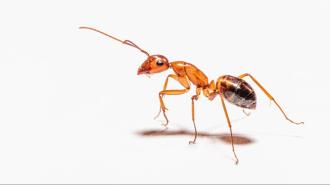team of researchers primarily based out of Sorbonne University in Paris has trained ants to recognize the subtle scent of cancer cells, hinting at their tantalizing potential to detect cancers in humans. The researchers’ fascinating findings were recently published in the journal iScience.
Widely known for their remarkable ability to cooperate and their ridiculous relative strength (able to carry between 10 and 50 times their own body weight), ants have only recently been lauded for their keen sense of smell. In 2012, scientists at Vanderbilt discovered that they have four to five times more odor receptors than most other insects. It turns out, as perhaps the quintessential social insect, ants use their sense of smell to communicate with and distinguish other individuals in a densely populated colony.
These recent findings undoubtedly contributed to the Sorbonne researchers’ curiosity to test ants as cancer detectors. In their study, the scientists first trained dozen of ants of the speciesFormica fusca, commonly found throughout Europe, to differentiate between human cancer cells in a growth medium, growth medium alone, and empty tubes. They did this by placing a tempting sugar solution near the cancer cells as a reward. When the sugar solution was removed from the test, the ants would still seek out the cancer cells, associating their smell with the delectable sugar.
The researchers then successfully carried out a similar test with cancerous and healthy human breast cells. Afterwards, they even trained the ants to differentiate between two distinct cancer cell lines. The ants became highly accurate at recognizing targeted cancer cells after just three training trials.
To showcase how exemplary the ants’ performance truly was, the researchers compared it to that of dogs. Dogs are currently the most widely used and studied animals for scent detection. “Ants are equivalent to dogs… in terms of detection abilities,” they wrote. “In some respects, ants surpass dogs because they need an extremely shorter training time (30 minutes compared to 6-12 months for a dog) and a reduced cost of training and maintenance.”
Dogs vs. Ants
Dogs, however, have been trained to detect signs of cancer in breath, plasma, urine, and saliva samples. It remains to be seen whether ants can reach that level of resolution, but the Sorbonne team plans to find out if they can.
The researchers also wonder whether ants could make themselves useful in other real-world situations where sniffer dogs are currently employed. “Our approach could potentially be adapted to a range of other complex odor detection tasks including the detection of narcotics, explosives, spoiled food, or other diseases (malaria, infections, diabetes for instance),” they wrote.
Careful, pups. Ants might just put you out of work!
This excerpt was reprinted with permission of Big Think, where it was originally published.
